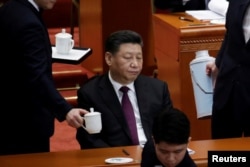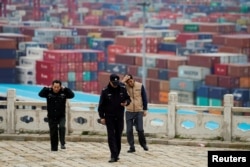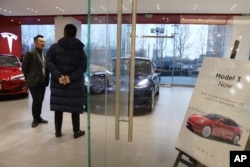The United States and China are working to finalize a trade agreement. But Chinese officials appear to be having problems persuading the country’s citizens on the need to enact the agreement and enforce its rules.
The problem for Xi Jinping and the government is both economic and political. It comes just as China’s yearly political congress opens in Beijing.
Around 5,000 delegates from around the country will attend the two-week congress. They include the heads of major Chinese businesses, both private and state-owned.
The trade deal may be difficult for state-owned businesses. Many are owned by Communist Party members who could lose a lot of money. Some state-owned companies receive large amounts of assistance from the government. Others are monopolies, meaning they control the supply of or trade of a product or service.
State-Owned Enterprises (SOE) employ millions of people in areas like energy, mining, banking and manufacturing.
"The Chinese government will face resistance from SOEs,” said Zhiqun Zhu. He is chairman of the Department of International Relations at Bucknell University in Pennsylvania. He added that resistance will also come from coastal provinces that are already actively trading with the United States and other countries.
During the legislative meetings, President Xi will be closely watched in China and around the world. Observers will see how he deals with issues such as the slowing economy and the dispute between the U.S. government and Chinese technology company Huawei.
Huawei is the world’s largest maker of telecommunications equipment. U.S. officials believe that the Chinese government is actively involved in the company and uses some of its equipment for spying. The United States and other western governments have banned the use of Huawei devices.
In an unusual move, China’s legislature may support a proposed law on foreign investment. Part of the proposal is meant to reduce pressure on foreign companies to hand over their technology to Chinese officials. This was one of U.S. President Donald Trump’s major criticisms of China when the trade war between the countries began.
China denies that the handover of technology is unfair, but may change the measure to help end the trade war.
The United States is asking China to buy more American-made goods. It is also demanding structural changes from Chinese industry. It wants China to end special treatment for SOEs, such as government assistance. The special treatment makes it impossible for companies in other countries to compete with Chinese companies.
"Structural reforms will be more difficult (for China) due to… interests of SOEs and local governments and businesses with extensive trade," Zhiqun said.
Paul Gillis is a professor at Peking University's Guanghua School of Management. He said, "Trade policy changes always have winners and losers. Expect opposition from the losers".
Nature of Opposition
Resistance to a trade deal will mostly happen behind closed doors and come from small groups of legislators. It will not be part of the publicly televised discussions of the National People's Congress and the China People's Political Consultative Conference. These are the two groups that are part of what political observers are calling the "Twin Sessions".
The main events are to be broadcast live on television. All speeches have been approved before the meetings, sources tell VOA.
"We have our system…once the President gives a directive, the delegates will not say no," said Shen Dingli. He is an international relations specialist who works in Shanghai. He added "the Twin Sessions will follow the leader's view.”
But some provincial leaders from more developed provinces and cities like Shanghai are worried about the effects of any new agreement on their local economy.
Leaders of several SOEs are asking the government to change the way it rates their companies’ performance. They expect that profits will fall because of the new agreement.
"It is up to the central government and President Xi. If they are really determined to carry out structural reforms, they can,” Zhiqun said.
Lost Profits
Some observers believe that the SOEs will not face loss of profitability as a result of the new agreement.
“I think they can handle that," Gillis said, talking about competition from foreign companies. He pointed out the SOEs have faced competition from foreign companies since 2001, when China became a member of the World Trade Organization.
"The competition seems to have made many of these companies stronger," Gillis said.
Chinese experts said things will not change quickly, even with a new trade agreement. The Chinese government was moving towards a market economy for its own reasons before the trade war. Now it will move more quickly.
Shen said, "The question is: Can China stop all subsidies to state owned enterprises? In some cases, China is not ready now, it needs a few years.”
Shen added that the United States should accept it will take some time.
I’m Ashley Thompson.
And I'm Caty Weaver.
VOA’s Saibal Dasgupta reported this story. Susan Shand adapted it for Learning English. The editor was George Grow.
Write to us in the Comments Section or on our Facebook page.
_____________________________________________________________
Words in This Story
subsidy – n.money that is paid usually by a government to keep the price of a product or service low or to help a business or organization to continue to operate
monopoly – n. complete control of the supply of goods or of a service in an area or market
session – n. a meeting
source– n.the root of something; where something begins or its cause








